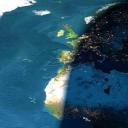Just heard on CNN, a Beijing woman brandishing a lettuce and complaining that “the government has lost control of prices”. Yes, dear, that’s called a “free market economy”. Get used to it.
Labor’s better economics qualifications
The Labor party a risk to the economy? Perhaps not, since eight of their front bench have degrees in economics — including Craig Emerson with a PhD — while only three Coalition ministers have the qualifications.
Rediscovering the language of moderation
I’m a big fan of joined-up thinking. You know, not just looking at each individual piece, but looking at how they fit together (or not) and what that tells us about The Big Picture. But there doesn’t seem to be much joined-up thinking in contemporary Australian politics.
Take, for example, “economic management”. Senator Andrew Bartlett wrote about this very point yesterday:
The battle for bragging rights about which party is supposedly the best economic manager is faintly ludicrous, given that both sides at various times have made a point of emphasising how similar their basic tax and economic policies are to the other – with the partial exception of workplace relations. The posturing about supposedly conservative good economic management is even more absurd – and indeed somewhat alarming – when one realises that these almost identical economic policies are neither conservative nor even very coherent.
Yes. I don’t understand how these facts all fit into one coherent picture:
- Lots of money coming in from big mining boom.
- Schools, hospitals, roads, trains, ports all in need of “urgent” fixes.
- Reserve Bank worried about inflationary measures.
- $34 billion in tax cuts! Spend, spend, spend!
Bartlett quotes a piece from George Megalogenis in The Australian which ends:
The task for Australia’s political class is to rediscover the language of moderation. Leadership at this stage of a 17-year growth cycle means telling voters that they can’t have it all.
But how do you tell Howard’s Battlers, the Kath & Kims of Australia, they they can’t have it all, and that the world isn’t just about them repeating the mantra of “I want! I want!”? The answers, it seems, is that you don’t. You just stay in your state of denial and hope for the best.
The Coalition launches its re-election campaign today — yes, I know that the entire year so far therefore has not been a campaign, just some sort of cheese grater. So it’ll be interesting to see whether they’ll propose a coherent plan for Australia’s future that actually addresses these core economic issues. My money is on the “No” vote for that one.
And they still get a vote, part 2
About 5pm this afternoon I overheard the following conversation on a train approaching Central station. I’m guessing these two guys were in their mid-20s, and weren’t merchant bankers.
Lad #1: Interest rates have gone up 25% today. So your rent’s going to go up.
Lad #2: What the fuck?
Lad #1: Yeah, I heard it on the radio. The guy who owns your place has to pay 25% more, so you’ll have to pay 25% more rent.
Lad #2: Fuck that! That’s what? Fuck! That’s $75 [presumably a fortnight]. No fuckin’ way! No cunt’s charging me any fuckin’ more for that fuckin’ crack den I live in.
And you thought you had it tough…
Exploding the “economic manager” myth
If “economic management” is a key factor in the election campaign, then I’m hoping someone manages to finally explode this myth that the Howard government is a good economic manager.
Yes, unemployment is low. Yes, interest rates have been low. Yes, there’s been a mining boom. But after (supposedly) 11 boom years under the Truthful Rodent, what have we got to show for it apart from huge credit card balances and a series of “emergencies”? What have we actually built for the future, as opposed to aspired to do?
Day and Night
I’ve been looking at this photograph for hours, scattered over the last few days.
It was apparently taken from the space shuttle Columbia. No it wasn’t, scroll down for the comments. I shouldn’t need to point out that the big lumpy thing in the foreground is called Africa, and further back there’s the thing they call Europe.
It fascinates me because it — literally! — puts things in perspective. Some of the world’s greatest cities are invisible, at least in daylight. The Low Countries are just starting to blaze in artificial light. But the brightest lights are the flares of oil wells in the deserts of Algeria and Libya, and off the coast of Nigeria.
Hey, aren’t the people there starving? That can’t be right, if they’ve got all that oil, surely?
Thanks to Memex 1.1 for the pointer.

